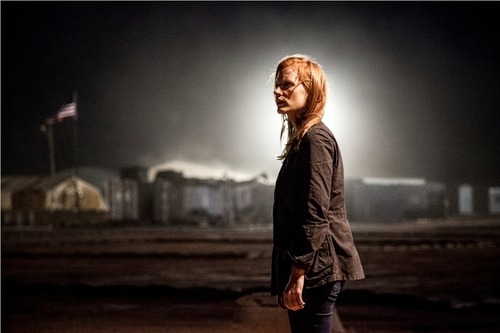
"You can't run a global network of interconnected cells from a cave."
In 2009 Kathryn Bigelow, one of the true journeyman (or journeywoman) directors of all time, finally got her due and was recognized with an Academy Award for directing the Iraq War-set film The Hurt Locker. For her follow-up, Zero Dark Thirty, she stays in familiar territory, chronicling the decade-long hunt for the mastermind of the 9/11 terrorist attacks on America, Osama bin Laden. In spite of knowing exactly how things turned out, Bigelow & screenwriter Mark Boal have managed to turn a foregone conclusion into a white-knuckle thriller.

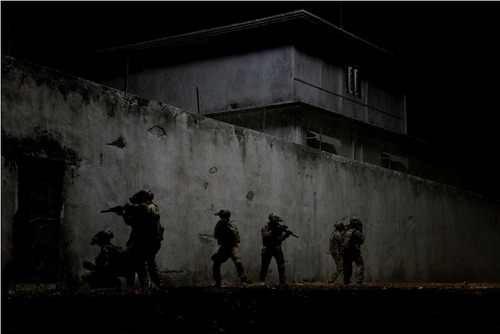
The film opens with several audio clips from the morning of September 11, from air traffic control workers to 911 calls from people inside the towers. It sets an appropriate tone, in that it gives the audience a very clear reminder of the importance of the manhunt that follows. A CIA operative named Maya (Jessica Chastain) arrives in Afghanistan in 2003 where she is introduced to Dan (Jason Clarke) one of the main operatives leading torture-based interrogations of detainees. The film follows Maya's attempts to gain intelligence on the whereabouts of bin Laden & try to succeed where all others have failed, in taking him down.
She follows several leads, but she is constantly drawn in by information about one man in particular, Abu Ahmed, a trusted courier in Al Qaeda's network, who may have intimate knowledge of bin Laden's whereabouts. The film shows that the path that lead to bin Laden's ultimate discovery was fraught with dead ends, massive failures in intelligence gathering, and lots of pure luck, but mostly through the determination of Maya to not give up at any cost.
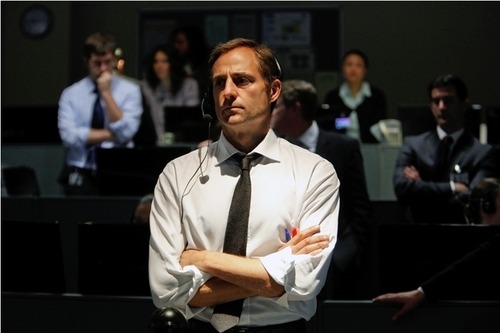
The character of Maya is a clear amalgamation of several people, but similar to how Boal & Bigelow created the character of Sgt. James in The Hurt Locker, they feel that focusing in on one main character can consolidate events & give the audience someone they can connect with and root for. As successful as they were in their previous effort, this is the main shortcoming of Zero Dark Thirty. There's no true emotional core to the film; It's purely clinical. The film is riveting and fascinating, but any attempt that they make to infuse any sort of emotional connection to the characters is met with indifference from the audience. Whether this is a good thing or a bad thing will likely be up to the individual viewers, but as much as I loved the film, I wanted to have some investment in its characters, particularly Maya.
Getting that out of the way, I can focus in on what worked about the film, and the answer is virtually everything else. The film is brilliantly structured so that every scene gives you a piece of information that leads you into the next scene. It's a classic thriller, in every sense of the word, and the way it ratchets up the tension and the stakes is masterful. The raid on bin Laden's compound that takes up the last half hour of the film is unbearably intense in the best possible way, and most importantly, it's 157-minute running time does not feel anywhere near as long as it sounds. I doubt it will work as well in subsequent viewings as it did in my first, but it's incredibly well paced for such a long movie.
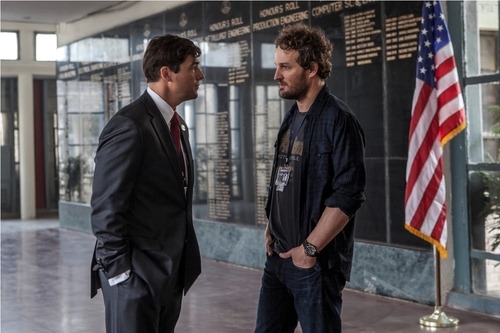
As for the 800-pound gorilla in the room, I have only this to say about the film's depiction of torture being used on detainees. It's an undeniable fact that torture was used and yielded at least partial answers that ultimately led to bin Laden's discovery. The film does not glorify torture in the way that a show like 24 did; It depicts it as being as brutal as it actually is. The film doesn't have a pro-torture stance, it simply has a pro-factual stance, and it was undeniably a crucial part of unraveling the full mystery of where bin Laden was. The film is not interested in examining the moral implications of such tactics, which many will say makes it guilty simply by that virtue, but I don't see this film as the proper place to debate whether or not torture is an effective means of gathering intelligence. It happened, it worked, and the film moves on from there.
The performances are all very good, but they're all in service of the overall plot of the film. Chastain is very good as Maya, but not in the same way that Jeremy Renner shined in The Hurt Locker. It's a very different kind of character, and she doesn't start getting really juicy scenes until late in the second act. She's very good in the film, but is not the main reason for the film's success in the same way Renner was in The Hurt Locker. Jason Clarke is very good in his role as well, as are Mark Strong & Kyle Chandler. Joel Edgerton & Chris Pratt are also very good at establishing some character for the men in Seal Team Six, but once they get their gear on, they're totally indistinguishable from one another.
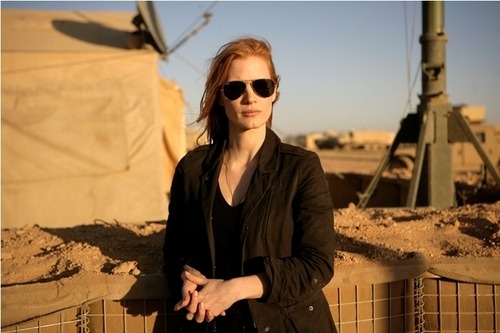
Zero Dark Thirty is an excellent film, but it's not revelatory. It's a solid thriller and will likely earn its place in cinema history through its social and cultural relevance, and the fact that it's damn entertaining. I'm just not sure that completely sealing it off from an emotional connection to the audience was the right move to make. It's virtually impossible not to admire the film, but the final shot ends up feeling hollow because of the total dearth of emotional connection that leads up to it. The film is pure Mr. Spock logical, all the way, but trying to tack on a Wrath of Khan-esque ending falls short because it skirts everything that's not relevant to the plot, namely personal connection & emotion. You won't help but appreciate the film, but I doubt you'll truly love it.
GO Rating: 4/5

[Photos via BoxOfficeMojo]
No comments:
Post a Comment